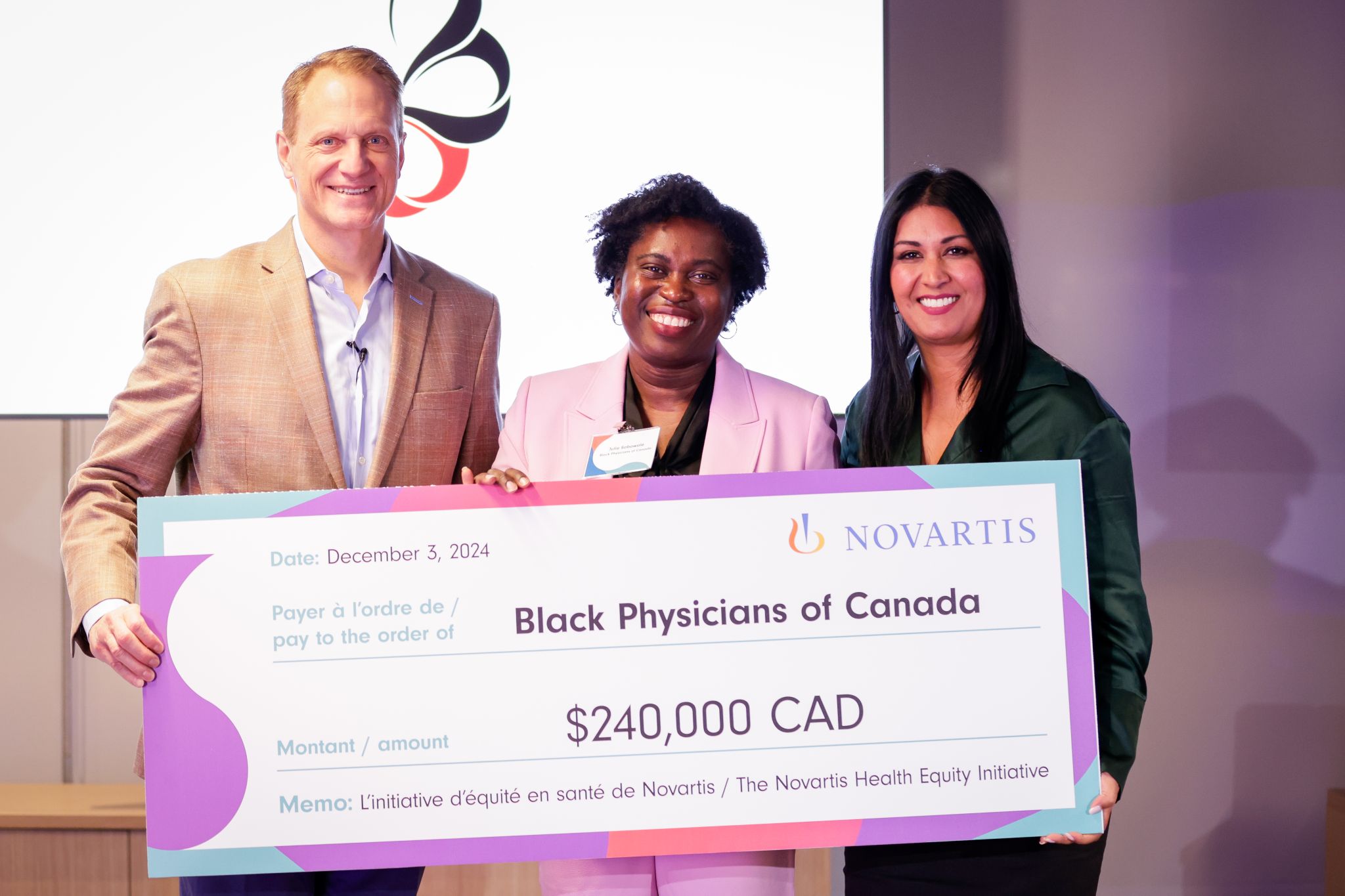Black Physicians of Canada is transforming access to healthcare by establishing a national database that connects Black patients with culturally sensitive care providers. With support from Novartis, the organization is also tackling systemic gaps in data, representation, and mentorship.
Despite Canada’s global reputation for universal healthcare, glaring disparities persist—particularly for Black Canadians and other marginalized groups. These inequities are not just abstract statistics; they manifest in everything from maternal mortality to the chronic lack of access to culturally competent healthcare professionals. At the forefront of addressing these challenges is the non-profit organization Black Physicians of Canada (BPC), whose mission is to create systemic change through advocacy, representation, mentorship, and research.
In late 2024, BPC was named one of three inaugural recipients of the Health Equity Initiative grant by Novartis Canada, securing $240,000 to scale its national efforts. For Julie Sobowale, BPC’s Executive Director, the funding not only validates the organization’s mission but also allows them to fast-track initiatives that were previously out of reach. In an in-depth conversation with AfroToronto, Sobowale shared the scope of BPC’s work, the power of mentorship, and how a national physician database is set to shift the landscape of Canadian healthcare.
The power of recognition and representation
Receiving Novartis’ grant was more than a financial boost—it signified an institutional acknowledgment of the urgent need to address Black health disparities. “Initiatives like this aren’t readily available in Canada,” explained Sobowale. “Novartis is taking a leadership role in filling a long-standing gap by investing in communities like ours—Black, Indigenous, immigrant populations—who are often left out of such funding opportunities.”

BPC, founded in 2020, has been working diligently to address the complex realities faced by Black physicians and patients in Canada. The organization focuses on representation at all stages of a medical career, from training and mentorship to leadership and policy advocacy.
Health inequity in practice: Gaps in data, outcomes, and access
One of the most pressing issues BPC is tackling is the lack of race-based healthcare data in Canada. Without this data, it’s impossible to accurately measure or address the gaps in care experienced by Black communities. “We’re far behind countries like the U.S. and the UK when it comes to race-based data collection,” said Sobowale. “It makes benchmarking progress extremely difficult.”
For instance, research on Black maternal health—one of BPC’s focus areas—reveals troubling disparities. A 2016 McGill study showed that 8.9% of Black women give birth preterm, compared to 5.9% of Caucasian women in Canada. While these numbers are slightly better than U.S. figures, they still reflect systemic gaps in care that disproportionately affect Black mothers and babies.
The database: A game-changer for culturally sensitive care
At the heart of BPC’s current efforts is the development of a national database of Black physicians. Though still in development, the database is designed to answer critical questions: Where are Black physicians in Canada? What are their specialties? How can patients, researchers, or fellow professionals connect with them?
This initiative directly addresses the demand for culturally sensitive care. “We know patients feel unseen and unheard in the healthcare system,” said Sobowale. “Having a physician who shares your background—or is at least culturally competent—can drastically change the patient experience.”
Beyond patient care, the database will also support professional collaboration, research, mentorship, and employment opportunities within the Black medical community.
Mentorship and microaggressions: Supporting Black physicians
Black physicians in Canada continue to face subtle and overt forms of racism throughout their careers. From microaggressions in medical training to systemic barriers for internationally trained doctors, the medical field remains difficult to navigate for many Black professionals.
To counter this, BPC has launched a national mentorship program aimed at medical residents and early-career physicians. “If you’re the only Black medical student in Saskatchewan, we want to make sure you still have a support network,” said Sobowale. The mentorship initiative provides guidance, advocacy, and solidarity, fostering safe spaces for Black medical professionals nationwide.
Scaling up with strategic support
The Novartis grant is enabling BPC to rapidly scale up several projects that were previously hampered by resource limitations:
-
Bilingual access: The website and upcoming physician database will be fully accessible in both English and French, reflecting Canada’s linguistic diversity and serving Black Francophone communities more effectively.
-
Website revamp: Existing health content on BPC’s website will be reviewed and updated to ensure it is evidence-based and user-friendly.
-
Database development: From technical infrastructure to privacy considerations, the database project will become public-facing within the next year.
-
Research & community events: Initiatives such as a community-led maternal health event in October will bring together lived experiences and healthcare practitioners to co-create solutions.

Expanding reach through partnerships
BPC is also collaborating with grassroots organizations across the country—from Montreal’s stem cell advocacy groups to Taibu Community Health Centre in Scarborough. These partnerships extend BPC’s impact on issues like donor registries, sickle cell anemia, and maternal health.
Rural and Indigenous communities are also part of the equation. BPC practices strong allyship with the Indigenous Physicians Association of Canada, taking cues from Indigenous leadership on how to support and amplify their initiatives without overstepping.
Reducing barriers for international medical graduates
Canada’s healthcare system is full of untapped potential. Many internationally trained doctors—often immigrants working in unrelated jobs—are unable to practice due to licensing restrictions. BPC is advocating for streamlined licensing processes to better integrate these professionals into the healthcare workforce, where they are urgently needed.
According to Sobowale, Black physicians are more likely to pursue family medicine, often serving marginalized communities. “By reducing these barriers, we not only help immigrant professionals thrive, but we also expand care in the places that need it most,” she emphasized.
Personal connection and the power of role models
Sobowale’s commitment to BPC’s mission is deeply personal. Her younger brother has sickle cell anemia, and his care as a child was overseen by a Black pediatrician—Dr. Smith. “The first doctor I ever met was a Black man. That image stayed with me,” she recalled. “If every Canadian could have that kind of connection—where you see yourself in your healthcare provider—it would change everything.”
As a Black lawyer and journalist, Sobowale brings a unique lens to her role. She understands systemic exclusion firsthand and is determined to build spaces where Black professionals feel supported and Black patients feel seen.
Corporate allyship that works
Sobowale praised Novartis Canada for being a learning partner, not just a funder. “They’re not just providing money. They’re asking questions. They’re showing up with open hearts,” she said. With a second round of funding now increased to $500,000 across new applicants, Novartis is setting a new standard for corporate involvement in community health equity.
Sobowale encourages organizations to apply. “Funding like this is rare. You get the financial support and a partner who truly understands what equity means.”
Final thoughts
The work of Black Physicians of Canada marks a critical moment in Canadian healthcare—one that blends grassroots activism with national strategy. By centring culturally sensitive care, expanding representation, and addressing systemic gaps with tangible tools like a physician database, BPC is laying the groundwork for long-term change.
Their efforts underscore a fundamental truth: equity in healthcare is not just about access—it’s about dignity, trust, and the right to thrive. Thanks to strategic partnerships, community engagement, and the vision of leaders like Julie Sobowale, the path to equitable care in Canada is becoming more visible—and more achievable.
In 2025, $500,000 will be awarded to changemakers who know their communities and their healthcare needs best. The application deadline for the Novartis Health Equity Initiative is June 30.






Comments powered by CComment